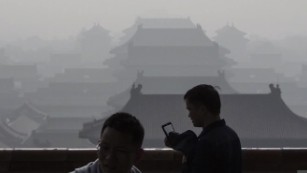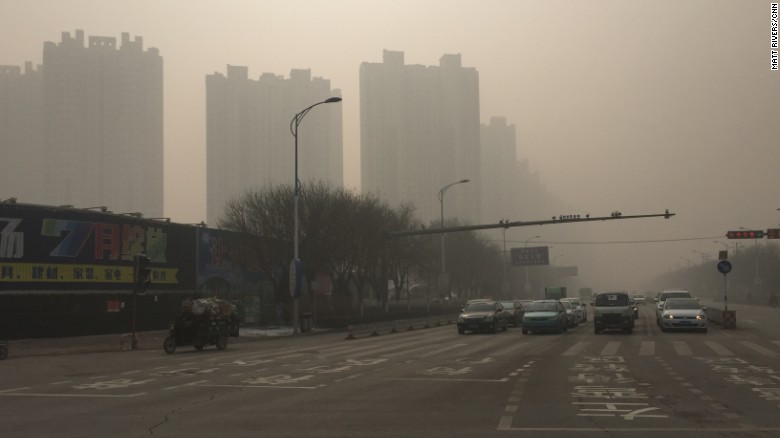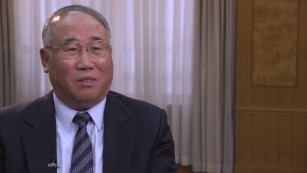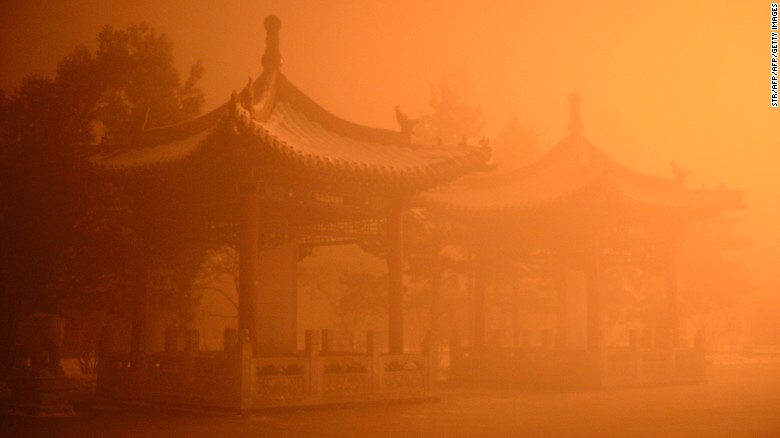Can China's most polluted city lead a green energy revolution?
In Baoding, China, the country's most polluted city, the smog is thick enough to see. It can burn your eyes and it can leave an acrid taste in your mouth.
This is the reality of daily life under the cloak of a toxic shroud.
It's the air Zhao Shuang and his family breathe in every day. He grew up in Baoding, and remembers a childhood of sunny skies.
Today, that is a rarity. His young son is a year old and has seen far more gray skies than blue.
"When the pollution gets really serious, we can't even see the buildings next to us," said Zhao, from inside the small apartment he shares with his son, wife, and mother.

China's demand for energy choking the capital
On Monday, the air quality reading (AQI) at one of the city's own monitoring stations stood at nearly 1,000, the worst in the country, according to China's own Ministry of Environmental Protection. According to United Nations guidelines, a reading of more than 100 is unhealthy for at-risk groups.
On the day Zhao spoke to CNN, the air quality wasn't that bad -- just four times higher than the United Nations' guidelines. But in a place like Baoding, that counts as a good day.
Read next: China issues smog alert

Roads and buildings in Baoding, China are seen shrouded in heavy smog on November 30, 2015.
City of contradictions
Zhao heads to work in the morning like thousands of others, masks covering their mouths as they walk by a coal powered plant shooting toxins into the sky as a cold snow falls.
But Zhao's factory hopes to make the coal that's to blame for much of the city's pollution obsolete -- Baoding, ironically, is leading the country's renewable energy drive.
The city of one million has been named the world's first "carbon positive" city -- home to more than 200 producers of alternative energy and energy-efficient technology.
Zhao works on the production line producing solar panels at Yingli Solar, one of China's largest solar power companies. It's headquartered in the middle of Baoding, and business is booming.
The company has rapidly expanded their output over the last two decades or so, and hope to more than double their current capacity by 2020.
"I believe there will be a large increase in the renewable energy industry, no matter whether it's solar power, wind power or others," says Allen Geng, the international sales manager for the company.
Heavy pollution lingering in the skies over China have prompted a surge in demand throughout the country for cleaner energy.
In 2014, Chinese companies invested more than $80 billion in everything from hydroelectric to wind to solar projects. No country in the world has invested more.
Coal still king?
Despite all of that, renewable energy accounts for only 10% or so of China's energy supply.

China looks to make progress with climate change
This is a country where coal is still king -- families keep piles of the black fuel on hand to burn for warmth during the winter months.
It is a major pollutant but it's also cheap and efficient, and because of that, it accounts for between 60% to 70% of China's energy mix.
Xie Zhenhua, China's special envoy on climate change, told CNN that it has shut down coal-fired power plants with the same power generation capacity of the United Kingdom -- and it still plans to replace many of these with cleaner coal-fired power stations.
According to Greenpeace, between January and September, China approved at least 155 coal-fired power plants this year -- that's four a week.
But Xie says China, the world's largest greenhouse gas emitter, will still meet an ambitious target to have emissions peak by 2030.
It's a much-needed target. According to China's latest assessment of climate changereleased in November, the country could see average temperatures rise by as much as 5 degrees Celsius by the end of the century.
China has already seen coastal sea levels rise by more than six centimeters and its glaciers have shrunk by 10%.
Pollution is personal
To meet its climate goals, China will need the help of more companies like Yingli, and more workers like Zhao.
For him, pollution is personal. He works 60 hours a week and walks home each day with his son.
Zhao hopes his work will help make things better, so his son won't be afraid to breathe deeply as he grows up.
"I'm very concerned about my son's health," said Zhao.
"If the air pollution stays like this, he won't ever be able to leave the house."
News Courtesy: www.cnn.com











